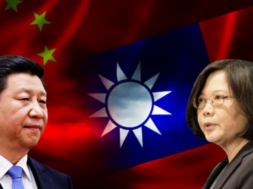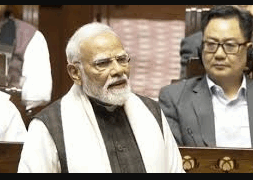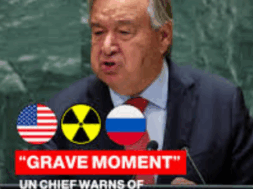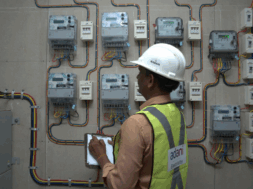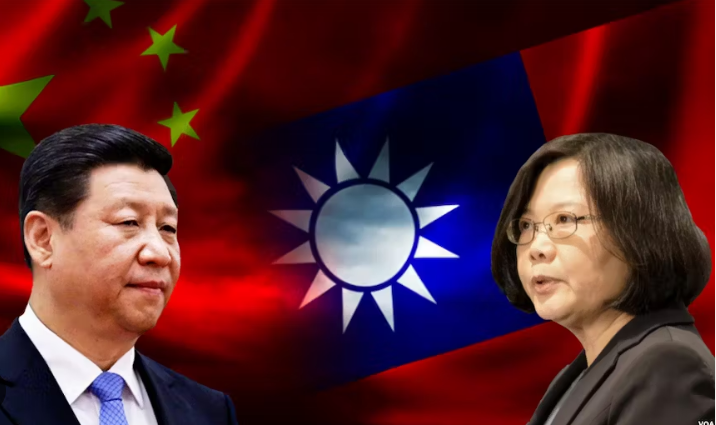
Roving Periscope: ‘China’s attack on Taiwan may cost the world USD 10 trillion’
Virendra Pandit
New Delhi: Alerts and warnings flooded mobile telephones across Taiwan on Tuesday as China fired a rocket over the south of the island state, just four days before Taipei goes to elections on January 13.
It wasn’t a missile as Taiwan initially believed, but a satellite. But the mistrust between Beijing and Taipei is so high that anything could trigger a war.
In the Chinese language, the alerts said: “China launched a satellite at 3:03 p.m. local time and it flew over the southern part of Taiwan. Please be mindful of the unidentified objects and report them to police.” In English, however, it said it was an “air raid alert” for a “missile flyover Taiwan airspace, be aware.”
The warnings came as Foreign Minister Joseph Wu was briefing foreign media in Taipei, just four days ahead of Taiwan’s presidential and legislative elections on Saturday.
China’s official CCTV said on its Weibo account that the country had successfully launched its Einstein Probe satellite from the Xichang Satellite Launch Center in Sichuan Province.
Such warnings and alerts in Taiwan are not new as China increasingly threatens its breakaway island in a bid to ‘unify’ it with the mainland.
What if China launches an all-out war to gobble up Taiwan?
Besides creating a geopolitical catastrophe, it might cost USD 10 trillion to the world, according to Bloomberg Economics which designed models based on geopolitical and economic matters affecting the world.
On Tuesday, Bloomberg reported that China’s invasion of Taiwan could cost around USD 10 trillion, nearly 10 percent of the global GDP, dwarfing the blow from the Russian war in Ukraine, the COVID pandemic, and the Global Financial Crisis (2008).
China’s economic and military heft, Taiwan’s burgeoning sense of national identity, and fractious relations between Beijing and Washington mean the conditions for a crisis are in place. With cross-Strait relations on the ballot, Taiwan’s January 13 election is a potential flashpoint, it noted.
But China is also fighting its internal demons. Its People’s Liberation Army (PLA) is not yet massing troops on the coast. Reports of corruption in China’s military cast doubts on President Xi Jinping’s ability to wage a successful campaign.
Corruption in China is rampant and hundreds of thousands have been sacked and imprisoned since the Xi regime began in 2013. In recent months, he sacked the Foreign and Defense Ministers, and several top-ranking officials for alleged “corruption.”
So, China may well divert domestic attention to Taiwan by raising the patriotic bogey. Sensing this, Western investors to military planners and the swathe of businesses that rely on Taiwan’s semiconductors are already moving to hedge against the risk.
The impact of war in the Taiwan Strait would be far bigger. Taiwan makes most of the world’s advanced logic semiconductors, and a lot of lagging edge chips as well. Globally, 5.6 percent of total value added comes from sectors using chips as direct inputs — nearly USD 6 trillion. The total market cap for the top 20 customers of chip giant Taiwan Semiconductor Manufacturing Co. is around USD 7.4 trillion. The Taiwan Strait is also one of the world’s busiest shipping lanes.
The biggest hit comes from the missing semiconductors. Factory lines producing laptops, tablets, and smartphones — where Taiwan’s high-end chips are the irreplaceable “golden screw” — would stall. Autos and other sectors that use lower-end chips would also take a significant hit.
In the case of a war, Taiwan’s economy would be decimated with a 40 percent blow to its GDP. A population and industrial base concentrated on the coast would add to the human and economic cost. With relations with major trade partners turned off and no access to advanced semiconductors, China’s GDP would suffer a 16.7 percent blow.
For the US, further from the center of the action but still with a lot at stake — through the reliance of Apple on the Asian electronics supply chain, for example — GDP would be down 6.7 percent.
For the world as a whole, GDP would be down 10.2%, with South Korea, Japan, and other East Asian economies most impacted.
A key assumption in this scenario is that the US would succeed in enlisting allies in concerted and severe economic sanctions against China.
US officials say the Chinese reaction to then-US House Speaker Nancy Pelosi’s visit to Taipei in August 2022 helped convince other Group of Seven countries that the risk of conflict is real. Beijing saw it as a shift in the status quo that made Xi Jinping appear weak, particularly after domestic commentators suggested that China would be able to stop her from landing in Taipei.
The fallout from the Pelosi visit, which saw China conduct large-scale naval drills seen as practice runs for a blockade, helped build diplomatic muscle memory for concerted reactions, the US officials said.
For Taiwan, a small, open economy that has thrived through trade, GDP in the first year would be down 12.2 percent. For China, the US, and the world as a whole, GDP in the first year would be down 8.9 percent, 3.3pc, and 5pc respectively.
The reason for the smaller impact relative to the war scenario is that while the global economy still loses access to all of Taiwan’s chips, other shocks — including tariffs between the US and its allies and China, the disruption to Asian shipping, and financial market fallout — are scaled down.
Even if the outcome of Taiwan’s Saturday election doesn’t trigger an immediate crisis, it will define the direction of cross-Strait relations.
For Beijing, which views the island as part of its territory, any formal push for independence would cross a red line.
US officials say China may be planning a multipronged reaction to the election, with military incursions, economic sanctions, and grey zone tactics like cyber-attacks.
Statements by leaders in Beijing and Washington have added to the tension.
Chinese President Xi Jinping has repeatedly said that Taiwan is not an issue that can be “passed down generation after generation.” Along with his efforts to modernize the military, those statements have spurred speculation he wants to deliver unification on his watch, with 2027 cited as a dangerous year by US intelligence and military officials.
For his part, President Biden has said the US would come to Taiwan’s aid in the event of a Chinese invasion. That bluntness eroded layers of carefully crafted ambiguity about the US position, stoking anger in China and concerns the US is emboldening pro-independence boisterousness in Taiwan.
Investors and businesses are already preparing for the worst. Legendary investor Warren Buffett sold down his stake in TSMC in the first quarter of 2023, citing geopolitical risk as the reason.
Businesses and governments are also making preparations. Greenfield investment in electronics and electrical equipment rocketed to USD 181 billion in 2022 from USD 48 billion in 2020 as governments in the US, Japan and Germany started diversifying sources of semiconductor supply.
